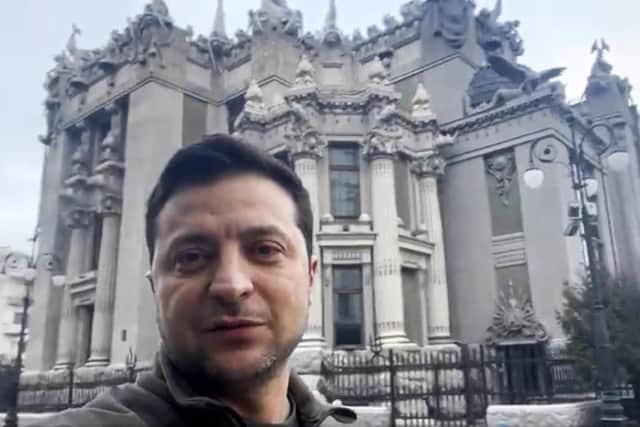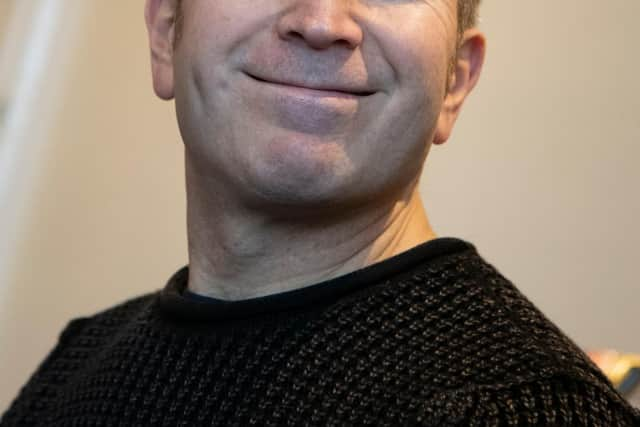Russia-Ukraine: How Vladimir Putin's war in Ukraine is taking shape on social media
What began late last month with calls to limit the reach of Russian state media platforms like Russia Today on social media as president Vladimir Putin launched his full-scale invasion of Ukraine had, by the end of the following week, descended into a brand boycott war, with Ukraine’s official Twitter account urging Pepsi to launch a “counterattack” on Coca-Cola after it refused to stop trading in Russia.
#BoycottCocaCola trended on the social media platform on Friday night as users posted images of bottle-shaped bullets emblazoned with the Coca-Cola logo.
Advertisement
Hide AdAdvertisement
Hide AdSuch is the nature of modern, digital warfare, in which photos of Ukrainian citizens armed with AK-47s have been given the Marvel Avengers meme treatment and the country’s president Volodymyr Zelenskyy has been immortalised as a Ukrainian Captain America.


Amid an overload of information on Twitter, Ukraine’s minister of digital transformation Mykhailo Fedorov is one of many Ukrainians showing the platform’s power to move and motivate.
Mr Fedorov has embarked on a Twitter ‘call out’ campaign, taking aim at Big Tech’s top chief executives like Elon Musk, Mark Zuckerberg and Tim Cook, with the hope of isolating Russia from the tech landscape.
"Mark Zuckerberg, while you create Metaverse — Russia ruins real life in Ukraine!” he posted. “We ask you to ban access to @facebookapp and @instagram from Russia – as long as tanks and missiles attack our kindergartens and hospitals.”
Social media platforms, despite being built to “move fast and break things”, are usually slow when it comes to taking action, but have moved faster than ever to label Russian state-affiliated media sources, or ban them altogether, and remove disinformation from timelines.


But where Facebook, Twitter and YouTube played a monumental part in the Arab Springs, Telegram and TikTok have now emerged as new tools and traps of modern day warfare.
Last week saw TikTok echo its social media rivals by labelling Russian state media. The platform announced the roll out of its new state-controlled media policy after research from the Institute for Strategic Dialogue revealed how Russian state-owned media outlets were using the app to spread disinformation and a denial of Mr Putin's war in Ukraine as merely a “military operation”.
ISD’s research found in amongst a flurry of explainers and conflict content on Russia Today and Sputnik TikTok channels were those which validated Mr Putin’s claims.
Advertisement
Hide AdAdvertisement
Hide AdOne from Russia Today’s RT News account, viewed 6.5 million times in two days, showed footage allegedly of the Snake Island soldiers previously believed to have been killed by Russian forces, with the video describing them as having “laid down their weapons and voluntarily surrendered”.


Meanwhile, Sputnik’s Spanish language account on TikTok had backed up Russian state claims that Mr Zelenskyy had fled Kyiv ahead of Russian military advancing on the Capital on February 27.
Viewed more than one million times on TikTok, the video remained online even after President Zelenskyy had taken numerous selfies and videos to confirm his presence in the Ukrainian capital.
TikTok has unleashed what Andrew Hoskins, professor of global security at Glasgow University and founding editor of the Journal of Digital War, calls a “swipe war”.
The highly-personalised, fast paced and immersive nature of TikTok and its algorithm, Prof Hoskins says, means “we've yet to really grasp what it means to live in and through these kind of digital personalised realities of war”.
“The paradox is the more information, images, immediacy and real time, the less we can comprehend and the less we know – and the more dependent we are on algorithms,” he said.
Some users on TikTok have been met with videos of Ukrainian teens showing the realities of wartime living, such as the viral video from 18-year-old Ukrainian TikTokker Dzvinka Hlibovytska entitled “my day as a Ukrainian in Lviv during war”, viewed more than 1.4 million times.
Others will have found their For You page covered in unverified footage of troops coming under fire, graphic images of bodies on the ground or fake livestreams from Kyiv.
Advertisement
Hide AdAdvertisement
Hide AdAs of Sunday, however, Russian users can’t view much on TikTok at all, with the platform announcing that in response to Russia's new ‘fake news’ law, which emerged with blocks on independent, foreign news outlets on Friday, it has suspended a number of services in Russia.
Access to Facebook, which first demonetised, downrated and later banned Russian state-owned media companies like Russia Today (RT) and Sputnik in the European Union and UK, was throttled in Russia before being banned completely on Friday, leaving almost eight million Russian users without access.
The result saw Google searches in Russia for Virtual Private Networks (VPN) and VPN downloads, allowing anyone to access the internet through a private, encrypted network connection, spike to new highs on Friday evening.
Dr Joanna Szostek, lecturer in political communications at Glasgow University, said: “It's incredibly important that Ukrainians continue to be able to post the positive, morale-boosting reports they have been.
"President Zelenskyy is doing a stellar job with all his social media appearances and he's really, really good at that stuff.
"But the obvious worry is that at some point there'll be infrastructure damage within Ukraine that makes that kind of community communication a lot harder.”
Where Russia is increasingly waging its information war in isolation, with Mr Putin “swallowing his own propaganda” as Dr Szostek puts it, Ukraine has been embracing social media at every turn – doing everything in its power to make sure that the eyes of the world stay locked on Ukraine.
Comments
Want to join the conversation? Please or to comment on this article.
